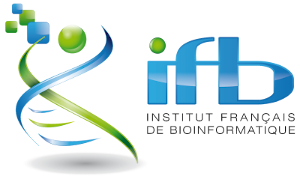
The IFB Core Cluster is the national computing cluster infrastructure of the IFB. It aims to meet the computational needs of all communities in the fields of health and biology, with a focus on users who do not have local computing resources.
The infrastructure is open to all users with an academic email address in France or in one of the ELIXIR member countries.
The core cluster is accessible through three methods:
The administration of the IFB-core cluster is done in collaboration. More than six engineers from five IFB platforms build and contribute to the project on a daily basis. In order to manage the multiple contributions, they are managed by CI mechanisms (Ansible + Gitlab runner) connected to a common code repository (Gitlab).
Full Cluster documentation: https://ifb-elixirfr.gitlab.io/cluster/doc/
Term of Usage: https://ifb-elixirfr.gitlab.io/cluster/doc/terms-of-usage/
Account management
Any academic user can request a IFB Core Cluster account from our account registration and management portail : https://my.cluster.france-bioinformatique.fr
Computing job submission
The main usage of the cluster is done from a SSH console though SLURM.
If you are new to SLURM, please read the IFB Core Cluster documentation and tutorial to learn how to submit your first jobs:
https://ifb-elixirfr.gitlab.io/cluster/doc/slurm/slurm_user_guide/
Interactive web portail
The Open Ondemand web portal lets you run interactive tools like RStudio or Jupyterlab on cluster resources through a simple web interface. Find the presentation page, the documentation and the dedicated video.
Galaxy
The IFB Core Cluster provides the computing resource of the French Galaxy instance: usegalaxy.fr
usegalaxy.fr provides a wide range of bioinformatics tools accessible online. Some tools are also accessible through thematic subdomain such as metabolomics, single-cell, covid19, etc.
Technical support
The support.cluster.france-bioinformatique.fr portal allows cluster users to contact our support team for any technical requests, including:
* Support for usegalaxy.fr is available on the IFB Community forum
Bioinformatics community support
A community forum allows you to exchange ideas with biologists and bioinformaticians about bioinformatics: uses and options of a tool, setting up a workflow around a specific theme, etc.
Training hosting
The IFB Core Cluster can provide computing resources for your training session. Many modalities are proposed by our support team (creation of temporary generic account, cluster resources reservation, etc.).
To request cluster resources for your course, fill in the request form.
If you have skills in bioinformatics tools or systems administration, join the IFB Cluster TaskForce to deploy your tools or contribute to the management of the IFB infrastructure and enter in the Legend. Do not hesitate to contact us by sending an email to: contact-nncr-cluster@groupes.france-bioinformatique.fr. Otherwise, if you wish to be trained in the technologies used on the infrastructure, training/tutoring sessions are regularly offered.
Continuous Integration (CI) & Collaborative work
The administration of resources is done in a collaborative manner. In order to control multiple contributions, these are managed by a continuous integration mechanism connected to a common code repository.
Traceability & Secured contributions
All installation, parameter setting and maintenance actions must be traced as far as possible. This is in order to:
We chose to use a Git directory hosted on a GitLab. Git meets all our traceability needs. As for the GitLab interface, it provides us with a place to exchange information and offers the possibility to work with Merge Request (Pull Request) and host our own CI job runners. These MRs require us to insert a code review phase before going into production. Each modification or addition is thus validated by a peer review to avoid errors and to ensure that at least 2 people are aware of it.
TaskForce members: